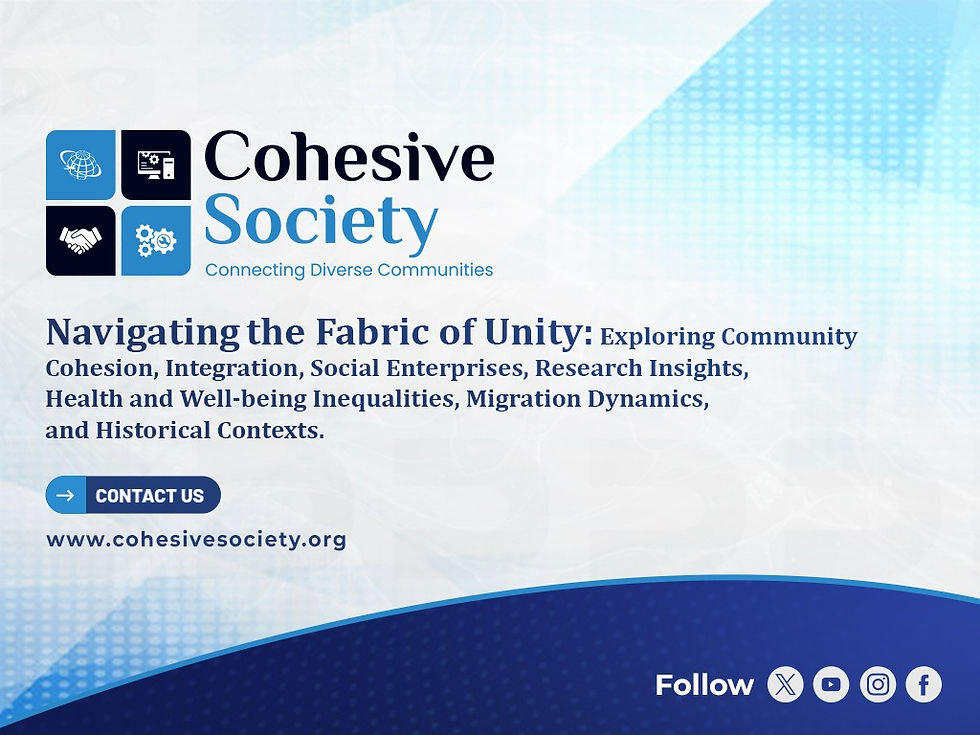Bridging Health Gaps: Addressing Physical Inactivity Amongst the Bangladeshi Community in the UK
- Imran Chowdhury B.E.M

- Jan 28, 2024
- 3 min read
Updated: Mar 29, 2024

Introduction:
The United Kingdom is a melting pot of diverse communities, each contributing to the nation's cultural tapestry. Among them, the Bangladeshi diaspora holds a significant place, but like many other immigrant communities, they face unique challenges that impact their overall health and well-being. Sedentary lifestyles, lack of physical exercise, and various other factors have led to a surge in underlying health issues within this community, ultimately straining resources for the National Health Service (NHS).
Challenges Faced by the Bangladeshi Community:

Sedentary Lifestyle and Lack of Physical Exercise:
Many members of the Bangladeshi community in the UK lead sedentary lifestyles due to demanding work patterns, financial constraints, and a lack of motivation to engage in physical activities.
Lack of Facilities and Resources:
Insufficient access to recreational facilities, green spaces, and financial constraints make it challenging for individuals to engage in regular physical activities.
Time Constraints:
Long working hours and familial responsibilities leave little time for exercise or leisure activities, contributing to the community's sedentary behaviour.
Healthcare Burden on the NHS:
The consequences of a sedentary lifestyle are evident in the increasing burden on the NHS as preventable health issues become more prevalent within the Bangladeshi community.

Suggestions for Overcoming Impediments:
Community Engagement and Support:
Establish community-based programs that encourage and support physical activities. Community centres can organize group exercises, sports events, and workshops to raise awareness about the importance of a healthy lifestyle.
Infrastructure Development:
Advocate for improved access to recreational facilities and green spaces within Bangladeshi neighbourhoods. Collaborate with local authorities to create safe and welcoming spaces for physical activities.
Flexible Work Arrangements:
Encourage employers to implement flexible work schedules and promote breaks for physical activities. This could include onsite fitness facilities or partnerships with local gyms.
Cultural Integration:
Infuse physical activities into cultural events and celebrations. Organize events that combine traditional practices with modern exercise routines to make fitness a part of daily life.
Education and Awareness:
Conduct health education campaigns within the community to raise awareness about the importance of regular exercise and its positive impact on overall health. Engage local healthcare professionals to provide guidance and support.
Course of Action:
Establish community wellness centres:
Create wellness centres within Bangladeshi neighbourhoods that offer affordable fitness classes, nutritional counselling, and health screenings.
Advocate for policy changes:
Work with local authorities to advocate for policies promoting physical activity, such as developing bike lanes, walking paths, and public spaces for recreational activities.
Collaborate with healthcare providers:
Partner with healthcare providers to offer preventive care workshops, health check-ups, and fitness programmes tailored to the needs of the Bangladeshi community.
Create mentoring programmes:
Develop mentorship programmes where individuals within the community who have successfully adopted a healthy lifestyle can guide and motivate others.
Conclusion:
Addressing the challenges the Bangladeshi community faces in the UK requires a multifaceted approach that combines community engagement, infrastructure development, policy advocacy, and education. By taking proactive measures, we can promote physical activity, improve overall health, and alleviate the burden on the NHS.
In addressing the health challenges faced by the Bangladeshi community in the UK, it is essential to recognize and respect religious lifestyle choices. Any initiative promoting physical activity should be culturally sensitive, considering religious practices and values. Community wellness programs should be inclusive and adaptable to accommodate diverse religious beliefs, ensuring that actions do not conflict with religious observances. Collaborative efforts with religious leaders can be instrumental in promoting health awareness within the community, emphasizing the compatibility of a healthy lifestyle with religious teachings. By aligning health promotion strategies with religious principles, we can create a supportive environment that appeals across the board, fostering unity and understanding. This approach ensures that the suggested courses of action address physical health and resonate with the cultural and religious fabric of the Bangladeshi diaspora in the UK.





Comments